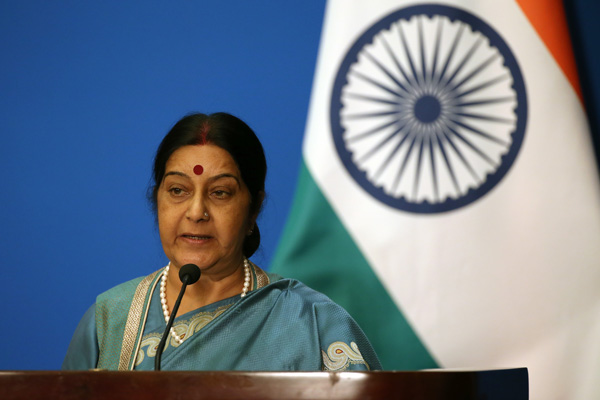#Review2015: despite Modi's epic air miles, foreign policy is on a wing & a prayer

In 2015, as in 2014, Narendra Modi energetically pursued an active foreign policy. But he paid little attention to strengthening the institutional structures that would make his efforts endure.
A robust foreign policy can't be sustained only by the instinctive efforts of leaders or the opinions of a couple of advisors. In an increasingly complex world, the need for stable, professionally competent and forward-looking institutional structures is becoming ever greater. Without them, adequate advice and purposeful management and follow-up of decisions taken and policies announced is simply not possible.
Individual excellence, political or professional, can add to the effectiveness of institutional structures; they cannot be substitutes.
Not up to the mark
The external affairs ministry is at the heart of India's foreign policy making institutional architecture. But it did not operate at optimal levels in 2015, and efforts at reform were insufficient and negligible. As a result, institutional drift was noticeable.
There was also clear discontent at senior professional levels. At the apex of the foreign policy making setup, under the leadership of the prime minister, is the external affairs minister. Sushma Swaraj, who has held the job throughout this government's tenure, is a big political leader with vast experience in the country's public life. She is well suited to be the political head of the foreign policy making apparatus - thoughtful and with a sure hand on the pulse of the country.
Is she making an impact on policy formulation and articulation? Or does she seem inhibited about playing a commanding role as is expected of the foreign minister? There was valid suspicion that she did not want the spotlight on her nor asserted herself fully in policy making.
This year, Swaraj paid great attention to the Indian communities abroad. In particular, she took the lead in pulling out Indians from conflict situations such as Yemen.

Photo: Wu Hong-Pool/Getty Images
While it's commendable that she is vigilant about the welfare of Indians abroad, this cannot be the primary focus of her endeavours. She has to be more forthcoming in publicly weaving together all the strands of policy and articulating India's vision and grand strategy. That is a political function. The diplomats under her should provide interpretation of this political vision, not its primary exposition.
Adrift without anchor
In January, Modi, exercising his prerogative as the prime minister, replaced Sujata Singh with S Jaishankar as the foreign secretary before her term was up. Jaishankar has a deserved reputation for competence and obviously enjoys the prime minister's confidence.
It was hoped he would take the initiative to restore collective leadership at the top professional levels of the foreign ministry and infuse the diplomatic corps with a sense of elan and purpose. As yet that hope remains unrealised.
As India's interests expand and its external environment becomes more complex, no single diplomat, however efficient, can effectively provide comprehensive professional advice to the political leadership. That's why the need for an institutional structure that can make such advice available on a regular and sustained basis is so urgent.
No single diplomat can give comprehensive advice to leaders, so strengthen institutions: @VivekKatju
The external affairs ministry's four secretaries - and the foreign secretary is only the first among equals - are independent in the discharge of their work portfolios. This suffered from time to time during the year, when the foreign secretary encroached on the turfs of the other three secretaries. This impairs their effectiveness with their foreign interlocutors. It is best avoided even if the political leadership so desires.
While the foreign secretary's work portfolio remained stable, that of the others saw too many changes. This smacks of ad hocism and sends wrong signals to the foreign partners concerned. The only way to avoid this is to create departments and notify them in the government business rules so that they cannot be easily changed.
Too many changes in senior diplomats' work portfolio smacks of ad hocism, says @VivekKatju
Although some flexibility is necessary to sufficiently respond to changes in the global environment, changes should not be made as easily as is currently the case.
What is required is the creation of a formal committee of secretaries with a regular secretariat. This would ensure that cross-cutting issues are dealt with collectively, and the political leadership would gain from the experience and knowledgeable of all the secretaries. Currently, the foreign secretary calls these meetings as and when he feels the need. The meetings often don't take place for long periods, which only reinforces the practice of working in silos.
The external affairs ministry's coordination with the country's security apparatus needs to be strengthened. Its equation with the National Security Advisor is somewhat vague. This is especially so with the conduct of policy with our neighbours. A greater clarity of roles is thus advisable.
Modi seems more comfortable dealing with individual advisors than with institutions. But for the sake of a robust, sustainable foreign policy, he needs to rethink this approach.





![BJP's Kapil Mishra recreates Shankar Mahadevan’s ‘Breathless’ song to highlight Delhi pollution [WATCH] BJP's Kapil Mishra recreates Shankar Mahadevan’s ‘Breathless’ song to highlight Delhi pollution [WATCH]](https://images.catchnews.com/upload/2022/11/03/kapil-mishra_240884_300x172.png)

![Anupam Kher shares pictures of his toned body on 67th birthday [MUST SEE] Anupam Kher shares pictures of his toned body on 67th birthday [MUST SEE]](https://images.catchnews.com/upload/2022/03/07/Anupam_kher_231145_300x172.jpg)






